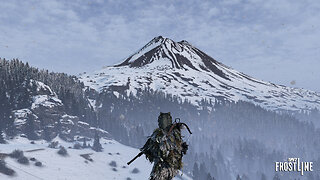Premium Only Content

Scott Ritter. Ukraine war: next step for U.S. Wagner group in Africa
Scott Ritter potcast. Scott answer questions from audience. What will be the next steps in Ukraine for united states and nato? Situation in Niger. Will it be invaded? Latest Wagner group actions in Africa. Will France go to war with Niger?
Scott Ritter latest.
Ritter served as a junior military analyst during Operation Desert Storm. He then served as a member of the UNSCOM overseeing the disarmament of weapons of mass destruction (WMD) in Iraq from 1991 to 1998, from which he resigned in protest. He later became a critic of the Iraq War and United States foreign policy in the Middle East. During the 2022 invasion of Ukraine, he wrote a series of opinion pieces for Russian state media outlet RT.
Ritter was born into a military family in 1961 in Gainesville, Florida. He graduated from Kaiserslautern American High School in Kaiserslautern, Germany in 1979, and later from Franklin and Marshall College in Lancaster, Pennsylvania, with a Bachelor of Arts in the history of the Soviet Union and departmental honors.
In 1980, Ritter served in the U.S. Army as a private. Then, in May 1984, he was commissioned as an intelligence officer in the United States Marine Corps. He served in this capacity for about 12 years. He served as the lead analyst for the Marine Corps Rapid Deployment Force concerning the Soviet invasion of Afghanistan and the Iran–Iraq War.
During Desert Storm (1991), as a Marine captain, he served as a ballistic missile intelligence analyst under General Norman Schwarzkopf. Ritter filed multiple internal reports challenging Schwarzkopf's claim that the US had destroyed "as many as 16" of Iraq's estimated 20 mobile Scud missile launchers, arguing that they could not be confirmed. In 1992 Ritter was quoted in a New York Times op-ed saying "No mobile Scud launchers were destroyed during the war." Ritter later worked as a security and military consultant for the Fox News network. Ritter also had "a long relationship of an official nature" with the UK's foreign intelligence spy agency MI6 according to an interview he gave to Democracy Now! in 2003.
Ritter worked as a weapons inspector for the United Nations Special Commission from 1991 to 1998, which was charged with finding and destroying all weapons of mass destruction and WMD-related manufacturing capabilities in Iraq. He was chief inspector in fourteen of the more than thirty inspection missions in which he participated.
Just after the coalition invasion of Iraq had been launched, but prior to troops arriving in Baghdad, British Prime Minister Tony Blair told the Parliament of the United Kingdom that the United States and the United Kingdom believed they had "sufficient forces" in Iraq. At that very time Ritter offered an opposing view on Portuguese radio station TSF: "The United States is going to leave Iraq with its tail between its legs, defeated. It is a war we can not win ... We do not have the military means to take over Baghdad and for this reason I believe the defeat of the United States in this war is inevitable ... Every time we confront Iraqi troops we may win some tactical battles, as we did for ten years in Vietnam, but we will not be able to win this war, which in my opinion is already lost," Ritter added.
Ritter was amongst a group of UNSCOM weapons inspectors that regularly took Lockheed U-2 imagery to Israel for analysis, as UNSCOM was not getting sufficient analysis assistance from the United States and the United Kingdom. This was not authorized by UNSCOM, the American U-2 having been loaned to UNSCOM and caused Ritter to be subjected to criticism and investigation by U.S. authorities. Iraq protested about the supply of such information to Israel.
-
 1:14:55
1:14:55
Mark Kaye
3 hours ago🔴 Is TRUMP the New George Washington of American Politics?
21.3K7 -
 LIVE
LIVE
Dcypled
4 hours agoSahkal with my good friend Gabe! | DayZ Adventures
234 watching -
 22:47
22:47
SLS - Street League Skateboarding
7 days agoAll the 9's - SLS Sydney 2024
12.1K -
 LIVE
LIVE
The Dilley Show
2 hours ago $11.44 earnedGovernment Confirms Aliens, RFK Jr VS Big Pharma and Q&A Friday! w/Author Brenden Dilley 11/15/2024
3,206 watching -
 1:18:52
1:18:52
Tactical Advisor
3 hours agoThe Vault Room Podcast 004 | Election Mayhem. What Now?!
23.7K1 -
 42:59
42:59
The Rubin Report
3 hours agoDid Biden Just Reveal His Real Feelings on Trump? | Co-Hosts: Michael Knowles & Gad Saad
78.8K47 -
 1:35:09
1:35:09
-
 1:49:49
1:49:49
Benny Johnson
3 hours agoTrump SHOCKS With Robert F. Kennedy Jr. HHS Pick, Fauci PANICS | Media Has MELTDOWN: 'MAGA Takeover'
85.9K84 -
 1:20:43
1:20:43
Graham Allen
6 hours agoRFK Joins Team Trump! MAKE AMERICA HEALTHY AGAIN + Sylvester Stallone Intros Trump At Mar-a-Lago!
104K84 -
 32:08
32:08
BonginoReport
6 hours agoRFK Jr. Prepares to Battle Seed Oils & Big Pharma (Ep.86) - 11/15/24
106K194